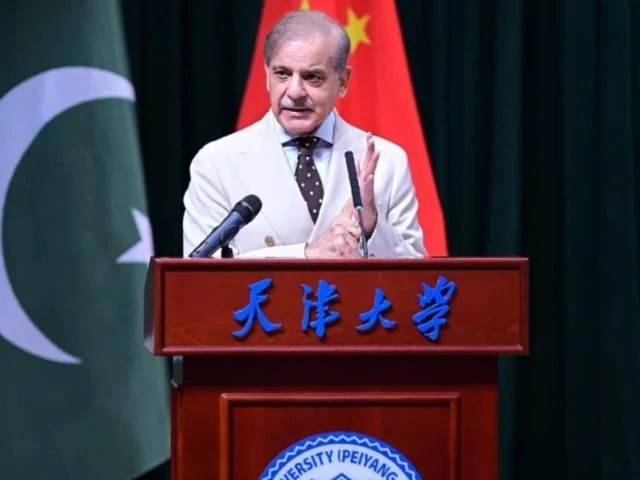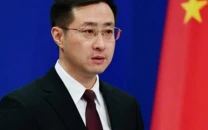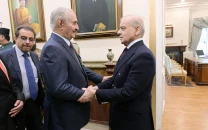PM raises Indus Waters Treaty issue at SCO
Shehbaz says Pakistan's sacrifices in war against terrorism must be acknowledged

Prime Minister Shehbaz Sharif on Monday used his presence at the Shanghai Cooperation Organisation (SCO) Council of Heads of State summit to deliver a wide-ranging address, raising the Indus Waters Treaty (IWT) issue and calling for a dialogue on all outstanding disputes.
Shehbaz told the leaders from the 10-member Eurasian bloc, including India, that Pakistan remained committed to peace, dialogue, and regional integration, but stressed that its rights under international treaties and its sacrifices against terrorism must be respected.
"Uninterrupted access to due share of water as per existing treaties among SCO members will strengthen the SCO working smoothly and will support the achievement of broader goals for which the SCO was established," Shehbaz said, referring to India's unilateral move to suspend the IWT in April.
Shehbaz reiterated Pakistan's preference for diplomacy over confrontation. "We respect all international and bilateral treaties and expect similar principles to be followed by all SCO members," he said. He called on leaders to support a "comprehensive and structural dialogue" to settle disputes
The prime minister reaffirmed Pakistan's commitment to "normal and stable relationships with all its neighbours", highlighting dialogue and diplomacy as guiding principles. "Pakistan has always believed in the power of multilateralism, dialogue and diplomacy, and shunning unilateralism," he noted.
Reassuring the bloc, he added: "Pakistan supports and respects the sovereignty and integrity of all SCO members and its neighbours. We will continue our efforts to promote progress and prosperity in the entire region and to ensure lasting peace in South Asia."
Shehbaz also drew attention to Pakistan's climate crisis, noting that the country was once again grappling with torrential rains and devastating floods. "My country is once again passing through unprecedented torrential rains, cloudbursts and massive devastation due to consequent flooding in three of our major rivers," he said, mourning the loss of lives, livestock, infrastructure, and crops.
"Underdeveloped countries like Pakistan are constantly facing climate change-induced disasters, even though our share in global emissions is less than one per cent. Global leadership needs to shoulder the burden, as further inaction will lead to more loss of life and livelihood."
The prime minister also addressed terrorism, recalling the March hijacking of the Jaffar Express near Balochistan's Sibi area. The attack claimed at least 26 lives, including 18 security personnel.
"We have irrefutable evidence of involvement of some foreign hands in the devastating Jaffar Express train hostage incident, as well as countless other terrorist attacks against us in Balochistan and Khyber Pakhtunkhwa (K-P) provinces," Shehbaz said.
Recalling Pakistan's sacrifices in the war against terrorism, he to the regional leaders that Pakistan had lost over 90,000 valuable lives and endured economic losses of over $152 billion – a "sacrifice which has no parallel in history."
Turning to Afghanistan, Shehbaz called for a peaceful and stable neighbour. He stressed that enhanced regional connectivity required efficient land, air, and rail corridors. In this regard, he said, the China-Pakistan Economic Corridor (CPEC) presented a practical demonstration of SCO's vision of integration.
The prime minister condemned Israel's "heart-wrenching bloodshed in Gaza" and its attack on Iran, a fellow SCO member. "Israel's unjustified aggression against our fellow brotherly member country Iran is condemnable and therefore unacceptable," he said.
At the SCO Plus session, Shehbaz praised President Xi Jinping's announcement of the Global Governance Initiative (GGI), calling it "a historic step towards a stronger multilateral system." He congratulated China on holding the successful summit and welcomed the Tianjin Declaration.
On the sidelines of the summit, Shehbaz met Iranian President Masoud Pezeshkian. The two leaders reviewed cooperation across diverse sectors, with both sides expressing satisfaction at the positive momentum in relations.
Shehbaz reaffirmed Pakistan's solidarity with Iran, while President Pezeshkian expressed sorrow over the floods in Pakistan and assured support.
Separately, Shehbaz met with a delegation from Tianjin Binhai New Area, led by Party Secretary Lian Maojun. He praised China's role in Pakistan's economic progress and highlighted CPEC's contributions to energy and infrastructure.
Looking ahead, he noted that the second phase of CPEC would focus on smart cities, agriculture, and next-generation technology industries. The Binhai delegation expressed keen interest in expanding trade, particularly in e-commerce and industry expansion across Pakistan.





















COMMENTS
Comments are moderated and generally will be posted if they are on-topic and not abusive.
For more information, please see our Comments FAQ